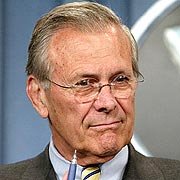Rebellion and Rumsfeld
 One of the big stories around Washington these days is the on-going semi-rebellion by military commanders against Donald Rumsfeld.
One of the big stories around Washington these days is the on-going semi-rebellion by military commanders against Donald Rumsfeld.The last few days have seen six generals of different sorts - all recently in retirement - coming out and asking for his replacement. All have been actively involved in the Iraq war the one way or the other.
Their criticism has been augmented by recent books giving more detailed descriptions on the run-up to the war. In focus are the obvious attempt by Rumsfeld and his close environment to severely limit the number of forces involved in the war.
In combination with the near-total absence of planning for what is referred to as Phase IV - what happens after the war - this paved the way for the chaos immediately after the fall of Saddam and many of the difficulties one has been struggling with in Iraq ever since.
There is no doubt whatsoever that this criticism against Donald Rumsfeld is highly justified.
But at the same time it is difficult not to feel slightly uneasy over military commanders criticizing the political leadership for involving themselves in their decisions.
The use of force in international relations is a supremely political affair. It's certainly not something that can be left to military logic alone. In that sense, the Secretary of Defense should have all the rights in the world to "interfere" in decision-making.
And in the US system it is in fact the President who is the ultimate commander of the armed forces. The command line goes from the President to what used to be called the CINC - Commander in Chief - of one of the regional commands, in this particular case the Central Command in Tampa, Florida.
But there is a myth in the US that war is something best left to the generals. President Bush has said time after time that he will support what the military commanders say. That's in line with the political culture.
Donald Rumsfeld has, however, been operating according to another principle. He hasn't really thrusted the generals.
In principle, I believe that the basic attitude of Rumsfeld towards political responsibility for the use of force in international relations has been the right one.
But in practise, he has been using this authority to take decisions that were obviously seriously wrong.
So the generals are right in practise but wrong in principle. And Rumsfeld the other way around.


<< Home